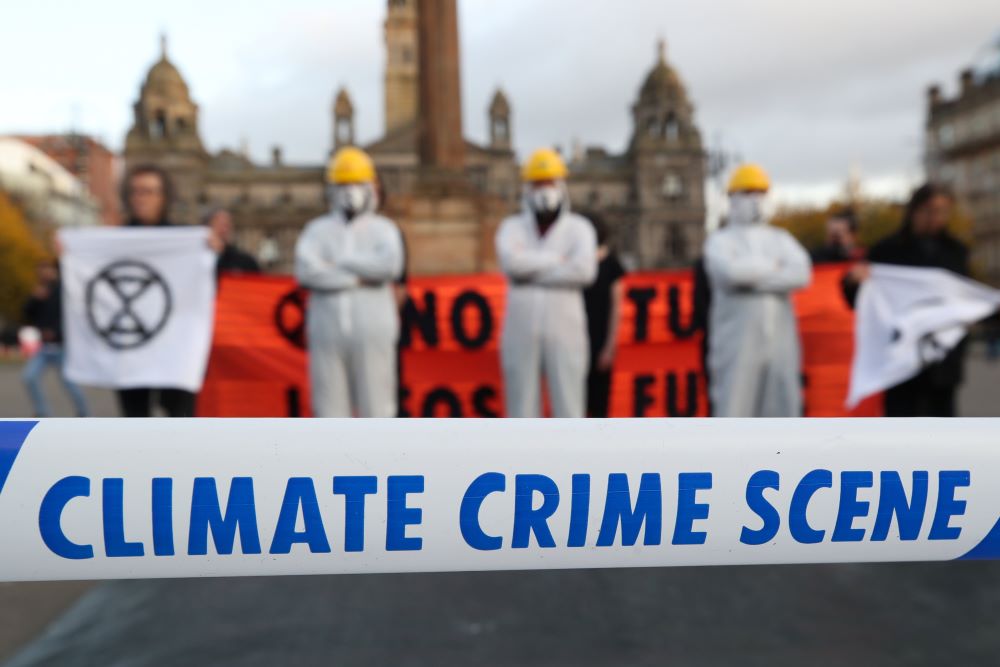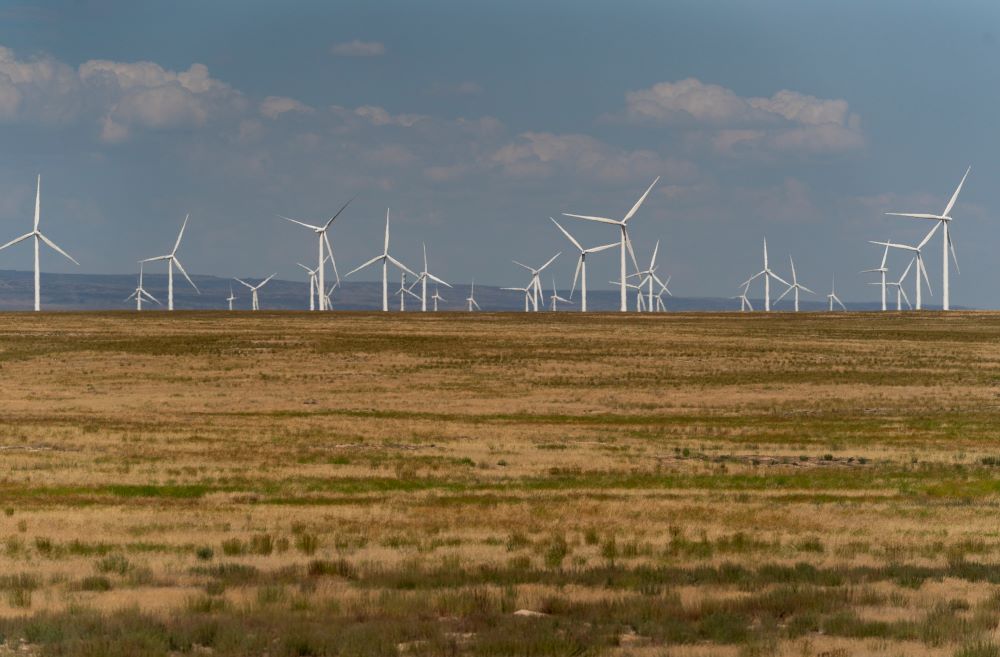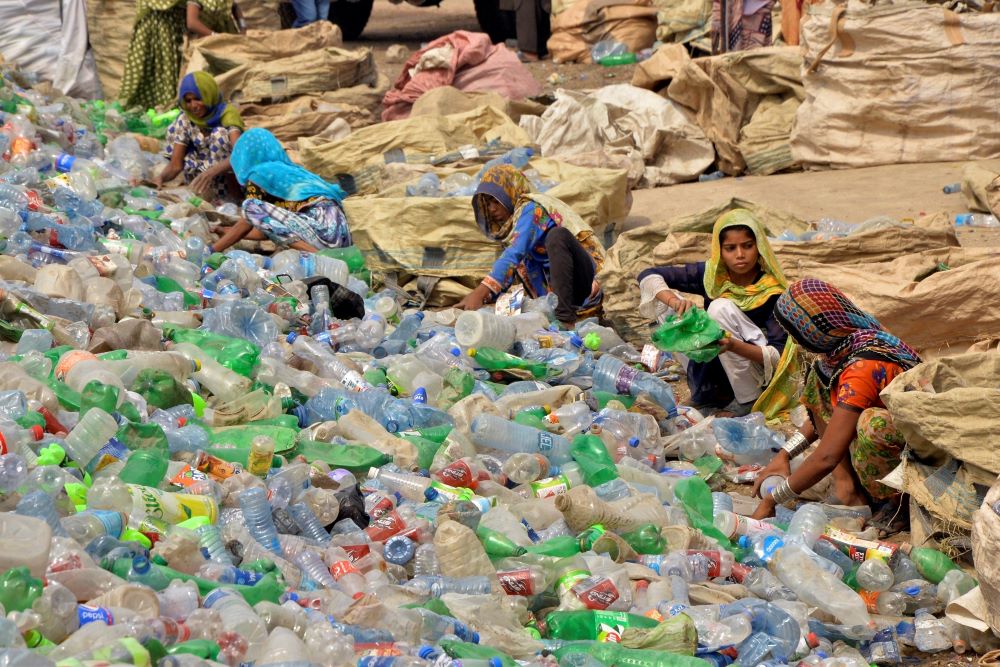
A BNSF railroad train hauling carloads of coal from the Powder River Basin of Montana and Wyoming travels east of Hardin, Montana, July 15, 2020. (AP/Matthew Brown, file)
Once upon a time, coal miners and oil riggers were viewed as American heroes, personifying everything virtuous about America — brave, adventurous, entrepreneurial. Today, they are more frequently viewed with scorn, tagged as culprits of our climate crisis. However, like the biblical plight of Job, their fall from grace has far less to do with their personal vices than with societal fear and our need to place blame. While our accusatory finger of climate blame is directed more pointedly at fossil fuel corporations, the intentional toppling of heroes to deflect responsibility remains.
For those fighting to stem climate change, the first and often final goal is to end the use of fossil fuels. The oil and gas industry has become the bête noire of climate. Swap green electrons and molecules for brown ones, eat fewer hamburgers, occasionally jump on our bicycles, read by LED light and all will be well. If only it was that easy.
No doubt we must, in the agreed language of the United Nations Framework Convention on Climate Change, transition "away from fossil fuels in energy systems, in a just, orderly and equitable manner." But the growing belligerence of the "End Fossil Fuels" movement turns the necessary personal and sociopolitical journey toward more virtuous behavior and a transformed political economy into yet another hostile battleground of victims and heroes.
This adversarial framing is neither healthy nor productive, let alone realistic. Even if we could magically end the use of fossil fuels tomorrow (and all investment and consumption indicators tell us that's not actually going to happen for a very long time), the root cause of much of climate change would remain: an economic system dependent on exponential economic growth, exorbitant consumption and a fixation on wealth accumulation.
Exxon and Shell have become the sinful goats that allow us to escape our own sins, remaining in the comforting womb of our profligate pro-growth lifestyles.

Protesters attend a demonstration against the fossil fuel industry Nov. 7, 2021, during the U.N. Climate Change Conference. known as COP26, in Glasgow, Scotland. (CNS/Reuters/Yves Herman)
Today's climate scapegoating drama reveals much about our confused and frightened approach to the climate challenge and the enduring human reluctance to face our darker shadows. (This scapegoating phenomenon also explains much of the national drift toward authoritarianism, with immigrants, liberal elites and the Chinese serving as causes of our misfortunes.)
Even if the Day of Climate Atonement were to arrive, with the fossil fuel scapegoat scurrying off into the desert, our rejoicing would be hollow, empty of meaning, for our personal destructive tendencies and structural inequities would remain.
Rather than look inward at our behavior and outward at systemic causes, we do what we habitually do, look for a technological fix to solve social, economic and political problems. And thus, we proudly promote carbon-free energy alternatives, anointing them with the transformative healing powers of sorcerer's potions of eras past.
For many, climate salvation is to be found in solar panels and wind turbines. The purported environmental purity of solar and wind is rapturously adopted as signposts to the promised land. The new gospel of energy prosperity is to let a thousand solar panels bloom and endless wind turbines rhythmically turn. Ecological acolytes profess that we can now fuel our daily economic needs not from devilish oil, gas and coal, but from sun bursts and wind gusts on high. The Manichean imagery is almost too perfect.
There is however a crack in this idyllic imagery and this newly forming fable of planetary restoration. For our freshly anointed energy savior has been found to have its own spots and wrinkles. It is now certain that our presumed manna from heaven is not as hallowed as once thought. There is a dark side to the clean energy revolution, as those of us who are longtime renewable energy advocates must now admit.

Wind turbines are seen from Interstate 84, July 9, 2023, near Hammett, Idaho. (AP/Lindsey Wasson, file)
Solar, wind and battery storage technologies all rely on a range of critical materials found beneath the Earth's crust and are thus dependent on similar mining methods, extractive tools and economic incentives as those of fossil fuels. These supposedly benign technologies are now reckoning with their own labor, environmental, social, ethical and economic conundrums. We are now realizing that it doesn't matter to which technological god you pray — oil derrick or wind turbine — the road to climate salvation entails something a bit more complex than fuel choices and new machines.
"The fault," as Shakespeare wrote, "lies not in the stars [Exxon/Shell] but in ourselves [lavish lifestyles]." Until we face up to that reality and stop pinning our salvation hopes on fossil fuels' demise, we'll never understand what climate change is truly about.
The anger that we feel toward the fossil fuel industry is certainly justified (not all scapegoats are without blame and we have ample evidence of oil and gas corporations willfully denying their contributions to global warming while continuing to impede climate mitigation action), but it will fail in its intentions if we don't move past our self-righteousness and seek a more restorative and politically astute path forward — a path that reconciles our past deeds and heroes with the imperative of conversion to a healthier future ecologically, politically and personally. We must imagine and build alternative futures and lifestyles that celebrate communities where, in the words of Catholic Worker Peter Maurin, "It is easier to be good."
It doesn't matter to which technological god you pray — oil derrick or wind turbine — the road to climate salvation entails something a bit more complex than fuel choices and new machines.
Unless we dig up the economic and political roots of the crisis and move beyond our neoliberal version of "cannibalistic capitalism" and hollowed-out democratic practices, the weedy entrails of the causes of climate change will persist. This work occurs at two levels, at the micro level with our individual behavior and at the macro level with massive economic and political change.
Individually, we must consume less, invest wisely and engage politically. Our daily decisions must manifest our roles as responsible stewards of our communities and give witness to our commitment to God's creation. Our behavior should be guided by prayerful discernment and conscious attention to consequences. But our individual behavior is constrained by structural and institutional forces that limit even our most well-intentioned actions. Therefore, perhaps even greater emphasis must be placed on overcoming the tyranny of those systemic impediments to virtuous behavior.
That work entails discovering democratic practices in new organizational and institutional forms. We must recover our role in determining economic trajectories and social policies. Our input to today's vital economic and public policies is shallow and largely inconsequential. This is in part due to the decades-old trend of increased privatization where value is extracted from public services for the benefit of the elite. We need to pursue innovative methods of public ownership of key sectors in the economy such as our power and water utilities, banking and health care, to name just a few.

Pakistani laborers, mostly women, sort through empty bottles at a plastic recycling factory in Hyderabad, Pakistan, April 30, 2023. (AP/Pervez Masih, file)
And as for fossil fuels, if we really want to expedite the end of their use, why not let the public decide how such fuels are used and who benefits from their extraction? Much of oil and gas exploration and drilling takes place on public lands. Why should the public not play a larger role in determining the future of that industry?
Furthermore, why should private interests garner obscene profits from public resources? Ample political models exist, such as cooperative ownership, citizen assemblies and related forms of democratic discourse and action, from which to choose and experiment. We should pursue and adopt political and economic practices founded not on the profit motives of shareholder value, private equity, and rent maximization, but on the prophet motives of Catholic solidarity, personalism and subsidiarity. Restoration of an authentic political democracy requires far greater economic, democratic practices and institutions. This won't be easy, but few things worth doing are.
Better to expend our righteous rhetoric and ecological zeal on changing the structures behind the energy system, than on simplistic slogans and political theater. Less placard waving, mass demonstrations and defacing of artwork and natural heritages and more political organizing and strategic coalition building. This applies to everyone from the Holy See to the household.
Pope Francis has been an inspirational voice on this topic, but the Holy See has utterly failed to transform his pious rhetoric into meaningful reality. As St. Francis of Assisi allegedly said to his brother friars, "Preach always, and if necessary, use words."
The prophetic insights that we currently channel into climate scapegoating of the fossil fuel industry are better placed speaking to a new vision of what could be. Instead of vilifying others and barking out demands, how about inventing a future that can inspire, that speaks to modes of work and play that are joyous and hopeful? We have a surplus of anger, but a deficiency of cheerful action. Let us Catholics shine a light on a more positive path of restoration and earthly stewardship.
Many Catholics are already doing so through a multitude of diocesan and community projects and programs guided by the words and spirit of church teachings. But much of that work is poorly shared, scarcely recognized by others and failing in its catalytic potential. The Catholic Church possesses the ideas, skills, resources and reasons for taking local and global leadership on transformational structural change. If not us, who?
Advertisement
Look around: A wellspring of individuals and groups seek change. They need help, help that should come from Catholics who take Scripture seriously and who appreciate the words and spirit of such documents as Laudato Si'. The beauty of the church's teaching on justice and equity, ecology and economics, is that it resonates with all major religions, Indigenous and otherwise.
An accelerated transition to renewable energy should of course continue, but an energy transition is not nearly enough, especially one that is founded on the simplistic yet necessary castigation of fossil fuels. Unless we spark a socio-economic-political transformation we will have forsaken the opportunities that crises present. In our fight for climate justice, we must vilify less (while holding corrupt and greedy corporate structures accountable) and be considerate of those heroes who have served us well in the past and who need our compassion now.
We must not let the scaped goat become the sacrificial lamb. Let us not get bogged down in contentious wordplay while fighting for justice and equity, but rise up and happily shape a new order. The cathartic sense of healing and reconstruction rather than the retributive impulse to punish and offend will serve our individual and planetary needs far better.





